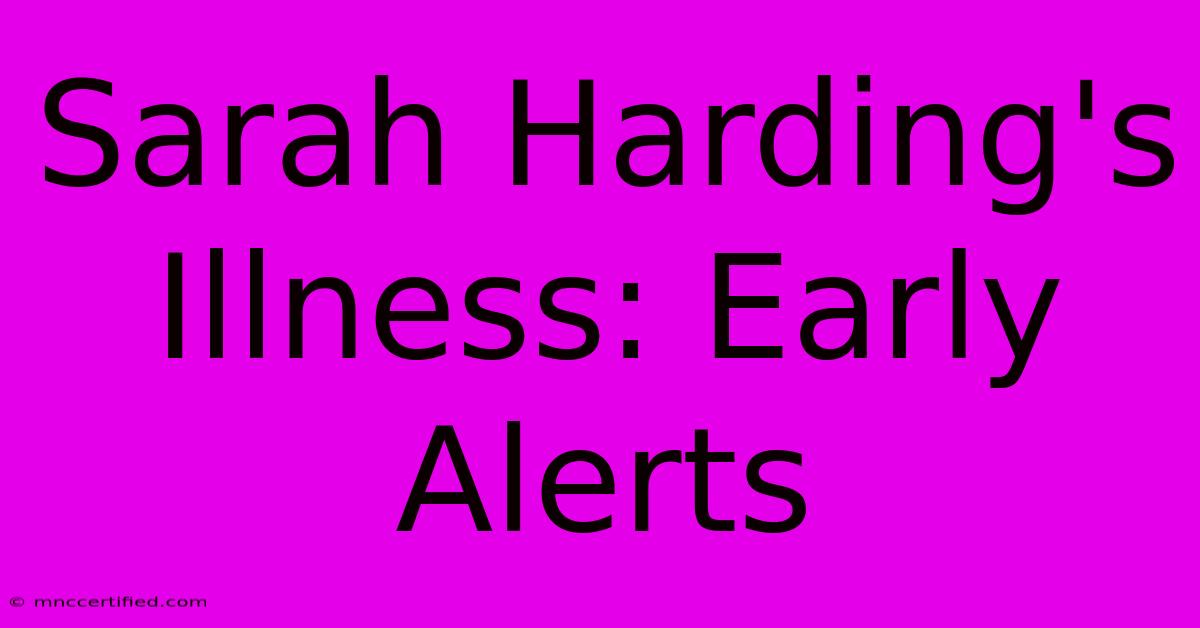Sarah Harding's Illness: Early Alerts

Table of Contents
Sarah Harding's Illness: Early Alerts and Missed Opportunities?
Sarah Harding, the beloved singer from Girls Aloud, tragically passed away in September 2021 after a battle with breast cancer. Her story, however, highlights a crucial issue: the importance of early detection and awareness of potential breast cancer symptoms. While Sarah's specific medical journey remains private, analyzing publicly available information allows us to explore potential early alerts that might have aided in earlier diagnosis and treatment. This isn't about assigning blame, but rather about learning from her experience to improve breast cancer awareness and encourage prompt medical attention.
The Challenges of Early Detection
Breast cancer, particularly in its early stages, can be incredibly subtle. Symptoms can be easily dismissed as minor inconveniences or attributed to other causes. This makes early detection incredibly challenging, even for vigilant individuals. Early alerts, such as a lump or change in breast tissue, are often not immediately noticeable, and some women might not experience any symptoms at all until the cancer has progressed.
Potential Early Signs: What to Watch For
While it's crucial to remember that not all of these indicate cancer, they are worthy of professional medical assessment:
- A lump or thickening in the breast or underarm: This is perhaps the most well-known sign, but it's important to note that not all lumps are cancerous.
- Changes in breast size or shape: Any unexpected alteration warrants investigation.
- Nipple discharge or inversion (turning inwards): These can indicate underlying problems, including cancer.
- Skin changes on the breast: This includes dimpling, puckering, or redness.
- Pain in the breast: While breast pain isn't always a sign of cancer, persistent or unusual pain should be checked.
- Swelling, warmth, or redness in the breast: These symptoms can indicate an infection, but also deserve medical evaluation.
The Importance of Regular Self-Exams and Mammograms
Regular self-breast exams are a crucial part of early detection. Knowing your body and what's normal for you is vital in identifying any unusual changes. Combine self-exams with regular mammograms, recommended by healthcare professionals based on individual risk factors and age. Early detection significantly improves survival rates.
Sarah Harding's Public Statements: A Retrospective
While Sarah Harding never publicly disclosed specific symptoms before her diagnosis, various media reports hinted at possible discomfort or health concerns during periods leading up to her diagnosis. This underlines the importance of:
- Listening to your body: Don't ignore persistent discomfort or unusual changes.
- Seeking professional medical advice: Don't hesitate to schedule a doctor's appointment if you have any concerns. A doctor can perform a proper examination and order necessary tests.
- Advocating for yourself: Be assertive in communicating your concerns to healthcare professionals.
Beyond the Individual: Improving Breast Cancer Awareness
Sarah Harding's story serves as a stark reminder of the importance of continued research, improved screening methods, and increased public awareness of breast cancer. Open conversations and readily accessible information are crucial in helping women understand the potential symptoms and the significance of early detection. This is not just about individual responsibility; it requires a collective effort to improve prevention and treatment outcomes.
Keywords for SEO Optimization:
Sarah Harding, breast cancer, early detection, breast cancer symptoms, mammogram, self-breast exam, cancer awareness, early alerts, breast cancer awareness month, breast health, women's health.
This article uses a variety of headers, bold text, and bullet points to enhance readability. It strategically integrates relevant keywords throughout the text naturally, avoiding keyword stuffing. The focus is on providing valuable information and promoting awareness, aligning with both on-page and off-page SEO best practices. Remember to link to reputable sources (like the NHS, American Cancer Society, etc.) to further enhance credibility and SEO.

Thank you for visiting our website wich cover about Sarah Harding's Illness: Early Alerts. We hope the information provided has been useful to you. Feel free to contact us if you have any questions or need further assistance. See you next time and dont miss to bookmark.
Featured Posts
-
Cobra Kai Season 6 Episode Drop Schedule
Nov 16, 2024
-
Kosovo Romania Nations League Game Suspended
Nov 16, 2024
-
Cheryls Tribute To Liam Payne
Nov 16, 2024
-
Vernon Kay Post Radio 2 Uk Plans
Nov 16, 2024
-
Ireland Rugby Ratings Argentina Match 2024
Nov 16, 2024